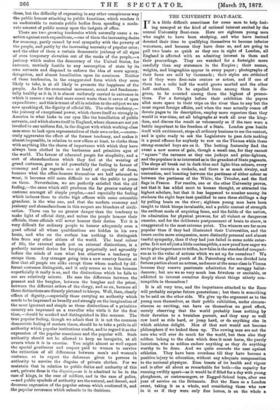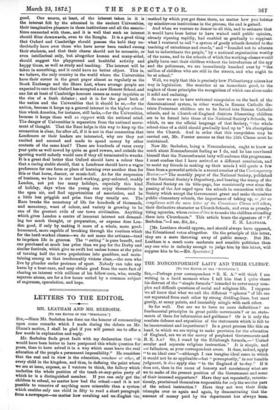THE UNIVERSITY BOAT-RICE.
TT is a little difficult sometimes for some men to help feel- ing annoyed at the kind of national interest excited by the annual University Boat-race. Here are eighteen young men who ought to have been studying, and who have instead devoted their time to qualifying themselves to become inferior watermen, and because they have done so, and are going to pull two boats as quick as they can in sight of London, all England is affected with an admiring interest in them and their proceedings. They are watched for a fortnight more carefully than any statesmen in the Empire ; their names, weights, and biographies appear in every paper ; photographs of their faces are sold by thousands ; their styles are criticized as if they were first-rate orators or actors, and if one of them has a colic half the world grows morbid and the other half exultant. To be expelled from among them is dis- grace, to be counted among them the highest of promo-. tions. For a fortnight before their exhibition the papers allot more space to their trips on the river than to any but the most urgent foreign affairs, and when the race actually comes off devote pages to its description, employ more reporters than they would in war-time, set all telegraphs at work all over the king- dom, and discuss the result as vehemently as if the race were a battle important to the freedom of a State. London goes beside itself with excitement, stops all ordinary business to see the contest, and is quite ready to ask the Legislature to pass Acts making it a penal offence for anybody to row on the Thames while these strong-muscled boys are on it. The betting fraternity find the event a new source of gain, though a small one, for they cannot " square " the oarsmen as they can jockeys and prize-fighters, and the populace is as interested as in the grandest of State pageants. The shops all break out in dark-blue and light-blue colours, every spectator mounts a cockade, and there is as much rivalry, and contention, and boasting between the partisans of either colour as between the partisans of the White, the Tricolor, and the Red flags in France. For results, one or the other University proves, not that it has added most to human thought, or attracted the highest scholars, but that it has happened to number among its students the eight boys best qualified to earn three shillings a day by pulling boats on the river ; eighteen young men have been taught to think biceps invaluable, and a public contest of strength the swiftest mode of acquiring fame, and the foible of the nation, its admiration for physical prowess, for all violent or dangerous exercise, and for the deliberate postponement of brain to sinew, is exaggerated to the most extreme point. The winners are far more popular than if they had illustrated their Universities, and the losers excite more compassion, more distinctly personal and almost tearful sympathy, than if they had just failed in some noble enter- prise. Is it not all just a little contemptible, a new proof how eager we are to give importance to trifles, how false is the standard of compari- son as to the value of actions which we set up for ourselves? We laugh at the gilded youth of St. Petersburg who are divided into furious parties about an actress, andsneer at the same class in Vienna because they reserve passionate admiration for scraggy ballet- dancers ; but are we so very much less frivolous or excitable, or addicted to interest ourselves deeply about things utterly con- temptible in themselves ?
It is all very true, and the importance attached to the Race will probably surprise future generations ; but there is something to be said on the other side. We give up the argument as to the young men themselves, as their public exhibition, under circum- stances so exciting, can have on themselves no good effect, merely observing that the world probably loses nothing by their devotion to a brainless pursuit, and they may as well row hard as ride hard, or jump hard, or do anything else in which athletes delight. Men of that sort would not become philosophers if we locked them up. The rowing men are not the men who will ever do much for the world, but then also they seldom belong to the class which does it most harm, the purely luxurious, who as seldom endure anything as they do anything worthy to be done. And we quite concede the case against athletics. They have been overdone till they have become a positive injury to education, without any adequate compensation to the national physique. Eton boasts of its health and vigour and is after all about as remarkable for both—the capacity for running swiftly apart—as it would be if filled for a day with young ploughmen, or costermongers, or Ragged-School boys, after one year of service on the Britannia. But the Race as a London event, taking it as a whole, and considering those who row in it as if they were only fine horses, is on the whole a
good. One source, at least, of the interest taken in it is the interest felt by the educated in the ancient Universities, their imaginative pleasure in those institutions and all the associa- tions connected with them, and it is well that such an interest should filter downwards, even to the Roughs. It is a good thing that Oxford and Cambridge should possess the hold they un- doubtedly have over those who have never been ranked among their students, and that their charm should not be monastic, or even intellectual only, but altogether human and many-sided, should suggest the playground and healthful activity and happy times, as well as study and teaching. The interest will be taken in something, and it could have no better object. This is, we believe, the only country in the world where the Universities have their corner in the great paper almost as regularly as the Stock Exchange and the Share List, where average people are expected to care that Oxford has accepted a new Honour School, and one list at least of Cambridge honours causes as many inquiries as the rise of a fresh debater ; and it is for the good both of the nation and the Universities that it should be so,—for the nation, because it keeps up a general interest in the higher educa- tion which America, for instance, still lacks,—for the Universities, because it keeps them well en rapport with the national mind. The danger of Universities is separation from the national move- ment of thought. That the Race helps in this way to keep up the connection is clear, for after all, if it is not in that connection that Londoners or their leaders are interested, why are they not excited and amused and made to spend money by other contests of the same kind ? There are hundreds of races every year quite as well rowed by quite as good rowers, and outside the sporting world nobody would care if they all terminated in wrecks. It is a great deal better that Oxford should have a colour than that a racing stable should, that a Londoner should have a vague preference for one form or place of learning over another than for this or that horse, dancer, or music-hall. As for the suspension of business, we have in our hard-working, grey-coloured, muddy London, not yet too many holidays, especially this kind of holiday, days when the young can enjoy themselves in the open air, and find opportunities of association, and be a little leas priggish and prim than they usually are. The Race breaks the monotony of life for hundreds of thousands, and monotony, want of colour, and variety is growing to be one of the greatest evils of our town civilisation. Anything which gives London a centre of innocent interest not demand- ing too much thought, or preparation, or expense does Lon- don good, if only by making it more of a whole, more good- humoured, more capable of breaking through the routines which for the hard-worked classes—we do not mean the artizans—tend to imprison life in grooves. The " outing " is pure benefit, and one purchased at much leas price than we pay for the Derby and similar festivals, which give us swift but useless horses at the price of turning half the town populations into gamblers, and main- taining among us that irredeemably vicious class,—the men who live by plunder under pretence of sport. Nobody can take any harm by a boat-race, and may obtain good from the mere fact of sharing an interest with millions of his fellow-men, who, usually separate atoms, are for a few hours united by a common subject of eagerness, speculation, and hope.



































 Previous page
Previous page